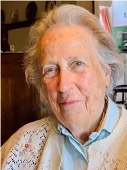#221– October 16, 2023

I.Assemblée
https://www.youtube.com/watch?v=zb2DLbhDctY
II.Contemplation
https://youtu.be/K-e55aK322A?si=SyhyW9JIRYIcmKN7
III.Faisceaux
https://youtu.be/3oTyRMCSHAA?si=i6s5fJjy7P_Ax3Dx
IV.Météores
https://youtu.be/E9luM-Pi4tA?si=P4aXjHu0ZwoYMehR
V.Brouillard
https://youtu.be/zibz2iunFLw?si=1_xCdVBse5JT-_ky
VI.Choral Varié
https://youtu.be/prtp4TbKSLw?si=luHaZyXxZdbjCHoN
Créneaux, by Belgian composer and academic, baroness Jacqueline Fontyn is our Composition of the Week.
Créneaux (slots), was written for symphony orchestra in 1982 and transcribed for Symphonic Band by the composer one year later, in 1983.
“This work was originally conceived for symphony orchestra; it was written for young musicians or amateurs with the intention of familiarizing them with certain aspects of instrumental writing of our time. Jacqueline Fontyn has remained true to her own style whilst avoiding technical difficulties. The six, fairly short pieces evoke the images suggested by their titles. “Assemblée” (Gathering) is based on a stylized trumpet call, treated with humor. In “Contemplation”, harmonious chords follow each other without haste: the challenge for the performers is to play pianissimo. After the entangled arabesques of “Faisceaux” (Bundles) come the resonant bursts and sudden breaks of “Météores”, written in A-B-A form, with a celestial central passage. The soft and vague sonorities of “Brouillard” (mist) precede the sixth piece, “Choral Varié” (variations on a chorale); which ends the work with a brief reminder of “Assemblée”.” (Program notes by the editor)
Créneaux has a duration of 17 minutes, and it is scored for large symphonic band, with flugelhorns, baritons, bass saxophone, contrabass clarinet and string bass ad libitum, as well as 5 percussion parts.
“Belgian composer Jacqueline Fontyn writes pure music, without pseudo-digestive pretensions, solidly contemporary (but not avant-garde) that is superbly constructed. She is not only one of the best Belgian artists but can be counted among one of the most important composers in Europe.” (Doron Nagan, Algemeen Dagblad, Rotterdam, 1981 – Press review after the premiere performance of Créneaux)
Jacqueline Fontyn was born in Antwerp, Belgium, where, at the age of five, her parents entrusted her to the wonderful Russian piano teacher Ignace Bolotine. She had lessons daily, and Bolotine encouraged her to develop her taste for improvisation. At the age of fifteen, she decided to become a composer. She received her grounding in the techniques of composition from Marcel Quinet in Brussels. She continued her musical education in Paris with Max Deutsch, a fervent disciple of Schoenberg.
In 1956 she attended Hans Swarowsky’s conducting class at the Akademie für Musik und Darstellende Kunst in Vienna.
From 1963 to 1970 she was Professor of Music Theory at the Royal Conservatory of Antwerp. From 1970 to 1990 she taught Composition at the Royal Conservatory of Brussels. She also taught at Georgetown University, the American University in Washington, D.C., and the University of Maryland, and worked as a music teacher in Baltimore, Los Angeles, Cairo, Seoul and Tel Aviv.
She is a regular guest of universities and conservatoires in Europe (Germany, France, Hungary, The Netherlands, Poland and Switzerland), the United States, Israel, Egypt, Asia (China, Korea, Singapore, Taiwan) and New Zealand.
She has received many awards, most notably the Spanish Oscar Esplanada Prize and the Prix Arthur Honegger from the “Fondation de France”. She was asked to write the set piece, a Violin Concerto, for the finals of the 1976 Reine Elisabeth International Music Competition and has twice undertaken commissions from the Koussevitsky Music Foundation in the Library of Congress, Washington.
Since 2006 most of her manuscripts are hosted in the music division of the library of Congress in Washington. in 2014, the Royal Library of Belgium acquired most of the manuscripts left in the country.
Jacqueline Fontyn is a member of the Royal Academy of Sciences, Poetry and the Fine Arts of Belgium and in 1993 the King of Belgium granted her the title of baroness in recognition of her artistic contributions.
Other works for winds include:
Frises (1975), 15’
Aratoro (1992) 13’
Blake’s Mirror (1993) 13’, for Mezzo-soprano and Wind Ensemble
Leopoldo Primo (2007), 5’
More on Jacqueline Fontyn
https://www.jacquelinefontyn.be/index2.html


